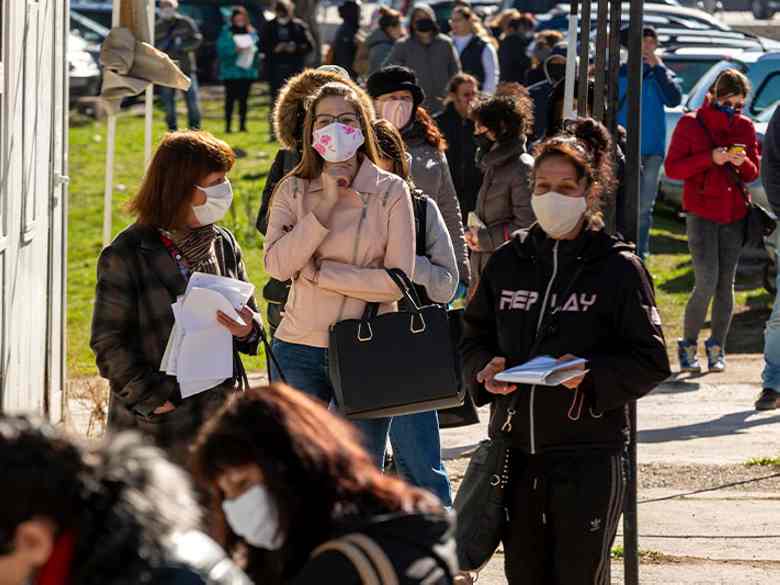The Dow Jones taking out 30,000, and Pfizer and Moderna vaccine trials attaining as much as 95% effectiveness have not stopped People’ view of the U.S. economic system’s outlook from slipping into pessimistic territory, the December IBD/TIPP Ballot finds. The rising toll of the coronavirus pandemic, the job market slowdown, and the shortage of recent federal stimulus probably stored People from specializing in the sunshine on the finish of the tunnel.
The IBD/TIPP Financial Optimism Index registered 49, dipping one level from the impartial 50 stage in November. A surge in optimism in early October had lifted the index to 55.2.
Congress now seems more likely to agree on a moderate-sized stimulus bundle, which can prolong eligibility for unemployment advantages. The rising invoice is not anticipated to pad advantages, because the March coronavirus invoice did. Even so, it may present crucial reduction for hundreds of thousands of long-term unemployed staff who’ve exhausted, or are near exhausting eligibility for advantages.
Dow Jones Report Fails To Increase Financial Optimism
The Dow Jones Industrial Common lastly topped its pre-coronavirus excessive of 29,569 on Nov. 9, then eclipsed 30,000 for the primary time on Nov. 24. Rising inventory costs have buyers in a very good temper. Amongst People with at the least $10,000 in household-owned equities or mutual funds, the IBD/TIPP Financial Optimism Index ticked up seven-tenths of some extent to 58.2. Nevertheless, amongst noninvestors, the IBD/TIPP index sank deeper into pessimistic territory, falling 2.1 factors to 43.4.
The IBD/TIPP Ballot finds a large divergence in financial optimism primarily based on revenue. People incomes as much as $75,000 a yr are fairly pessimistic, with Financial Optimism Index readings of 43.1 to 45.7. In the meantime, these incomes above $75,000 stay strongly optimistic at 62.5.
TradeStation And Vanguard Shoppers: We would Love Your Enter
Coronavirus Jobs Restoration Nonetheless Has A Lengthy Manner To Go
Final Friday’s jobs report confirmed that U.S. employers added simply 245,000 jobs in November, about half as many as anticipated. In the meantime, the Labor Division’s survey of households confirmed the unemployment price edging down to six.7%. However the decline took place as a result of extra folks stopped in search of work (400,000) than misplaced jobs (74,000).
Employers have added again 12.3 million jobs for the reason that April backside. Nevertheless, payrolls are nonetheless 9.8 million beneath their February peak.
The IBD/TIPP Ballot finds that 41% of households have at the least one member who’s out of labor and in search of employment. One other 42% are involved about job loss within the family. Factoring within the overlap, the share of job-sensitive households is at present 58%.
In the meantime, the IBD/TIPP Monetary Associated Stress Index dipped 1.3 factors in December to 65.4, nonetheless the second highest studying since April. Readings above 50 replicate rising stress.
But People favor measures to restrain the unfold of the coronavirus, even at a value to the U.S. economic system, by a 59%-30% margin.
2020 Election Shifts Views Of U.S. Economic system
Political beliefs are at all times a consider how People view the U.S. economic system. Below President Obama, Republicans had been invariably extra downbeat concerning the outlook, simply as they’ve been extra optimistic beneath President Trump — till now.
With President-elect Joe Biden set to take the reins, IBD/TIPP Financial Optimism Index readings confirmed Democrats turning optimistic in December (up 6.8 factors to 55.9) and Republicans rising pessimistic (down 9.9 factors to 48). The IBD/TIPP Ballot readings had been the best for Democrats and lowest for Republicans since November 2016.
In the meantime, independents grew a contact extra pessimistic (down one level to 40.3).
Financial Optimism Index Parts
The IBD/TIPP Financial Optimism Index is a composite of three main subindexes. They observe views of near-term prospects for the U.S. economic system, the outlook for private funds, and views of how effectively authorities financial insurance policies are working.
The six-month outlook for the U.S. economic system dipped seven-tenths of some extent to 46.3. The six-month financial outlook index hit a 14-year excessive of 57 in February, then tumbled as little as 37.3 in July.
The non-public funds subindex rose eight-tenths of some extent to 56.4, reasonably optimistic. The index hit a disaster low of 49.8 in June. January 2020 noticed a 15-month excessive of 64.6 factors earlier than the coronavirus unfold outdoors China.
The federal insurance policies subindex fell 2.9 factors to 44.4. February’s 57.9 studying was the best since June 2002. Earlier than the coronavirus hit, there was broad help for the Trump economic system.
The December IBD/TIPP Ballot displays an internet survey of 1,209 adults from Dec. 1-3.


